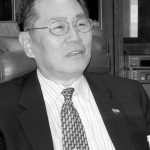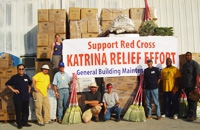
How many people want to be a millionaire, he asks, as a roomful of hands shoot up. Then he holds up a roll of toilet paper.
Never is heard a discouraging word – Immigrant eager to inspire others
01/25/2006
12:00 am
Sunny K. Park is on a roll.
How many people want to be a millionaire, he asks, as a roomful of hands shoot up. Then he holds up a roll of toilet paper.
When his children were younger, he said, they used a lot of toilet paper at one time. He admonished them that at this rate, they would never save any money. He dramatically rips off one sheet and holds it up.
“I told them, you only need this much,” he said. “But because I love you, I’ll be a nice guy and let you use two sheets.” Laughter ripples through the room.
Is this guy for real?
“I came to this country with no money, no language skills and no bank account,” he said. “But I made it. You can, too. I didn’t get up at 4:30 this morning to drive here and tell you a lie. The only reason I’m here is because I love you, and I care about your future.”
It is vintage Park, the 63-year-old businessman and founder of the Good Neighboring Foundation, a nonprofit organization formed in 1996 to encourage immigrants — especially Asian-Americans — to become active outside their communities.
Today, he is at Fort Gordon near Augusta, where his audience is at-risk youths enrolled in the Georgia National Guard’s Youth Challenge Academy. The participants are high school dropouts, and until they entered this highly structured program, most had few, if any, prospects for a bright future.
Park, who emigrated from South Korea in 1974, has come to tell them that if he can succeed as a businessman and community leader, they can achieve their dreams, too.
Park has visited cadets at the academy at Fort Stewart since 1998 but started his “If Sunny Can, You Can” road show in 2000. He’s been to YCA programs in Georgia, Arizona, Virginia, New Jersey and New York. Soon, he hopes to add Michigan. Teens learn about Korea, see a Tae Kwan Do demonstration and taste Korean foods like kimchi. Each time, Park tries to involve the local Korean community.
Park sees it as a way to give back to the United States, where he came to “build my American dream.” After being sworn in as naturalized citizen in 1986, he vowed to become the “best citizen this country ever had.”
His dream began in Seoul after the Korean War. Park was the only child of a low-level bank employee and a homemaker. South Korea was far different that the economically and culturally strong nation it is today.
“There was limited freedom,” he said. “I didn’t like it. You had to come from a good family background to establish yourself there, and I didn’t have those credentials.”
Park, a self-described brat, ran away from home at 14 to “test myself.” He went to one of Seoul’s many markets and begged a vendor to let him work for free in return for room and board and to have time off to go to school.
In 1974, he moved to the United States, first to Indiana where he enrolled in Indiana University-Purdue University at Indianapolis, and later to Atlanta.
Park became a community leader by accident. One day he was unloading furniture from a moving van when he was approached by another Korean man, who asked if he spoke English. The man then asked Park to help resolve a dispute at a local car dealership.
“That morning I became sort of a social worker,” he said. Word spread in the community and soon Park’s phone was ringing off the hook with pleas for help.
Eventually, he decided to start a cleaning service and employ some of the many people who were calling him for help.
One of his first jobs was at an office park on Presidential Parkway, where a job called for four people. He showed up with 21. “I had all 21 people in that small place,” he said.
Park now runs a real estate business, a high-tech cleaning service and his main business, General Building Maintenance Inc. Together, the companies employ more than 3,200 people in several states.
By the time Pin Pin Chau, CEO of the Summit National Bank, met Park 13 years ago, he had already made his mark in Atlanta.
“One thing that strikes me about Sunny is that he loves his culture yet he loves his adopted country,” the Hong Kong-born Chau said. “I remember one time coming out of some board meeting together. He looked at me and removed his lapel pin of the American flag and pinned it on me. He said ‘Pin Pin, you need to show your patriotism.’ “
Park certainly has. He is a member of the board of the National Museum of Patriotism in Midtown and once served on a President’s Advisory Commission on Asian Americans and Pacific Islanders.
But Jenny Hwang, a reporter for The Korea Times newspaper, said while Park is a fixture in the local Korean community, his ideas haven’t always been welcomed.
“Some people just misunderstand him,” she said. “He has a more American viewpoint, he’s Christian and he’s a Republican and he loves America. Some people don’t like that. Personally, I agree with that. He’s always saying that Korean immigrants have to be good friends and good neighbors to the Americans because we decided to live here. Some people think it’s just too much.”
Unpopular decision
The biggest rift was in 2002, when Park publicly supported Sgt. Mark Walker of Acworth, whose vehicle struck and killed two 13-year-old Korean girls walking along a narrow country road. The incident sparked anti-American protests in Seoul. Park, who helped raise money for Walker’s defense, was called a Judas and said he received more than 2,000 hate e-mails.
Walker could not be reached, but his sister, Lynn Samples, said the family appreciated Park’s help. “Sunny has to be one of the most honorable men I’ve ever met,” said Samples.
Park has also worked to build bridges between blacks and Koreans.
Several years ago, Park and the Rev. Gerald L. Durley, former president of Concerned Black Clergy of Metropolitan Atlanta and senior pastor of Providence Missionary Baptist Church, tried to start a mentoring program for Korean business owners and prospective African-American entrepreneurs. Part of the goal was to bring the two communities together after years of animosity and distrust. But it never got off the ground. The reason, said Durley, is that they both got busy doing other things.
Durley emphasized that he has high regard for Park. “I’d be willing to sit down with Sunny at the drop of a hat,” he said. ‘He has the enthusiasm and zeal to do anything.”
That enthusiasm is what prompted Park to wake up one recent Tuesday and drive to Fort Gordon to serve as a mentor to more than 100 youths.
“I feel so good about these kids,” said Park, as he donned a black baseball cap and climbed to the top of a platform to watch a local marital arts team demonstrate Tae Kwan Do. “These are smart kids, they just didn’t have the opportunity.”
Siera Winfrey, 18, of Augusta, said she was impressed by Park’s commitment to help. “This was really an experience for me,” said Winfrey. “I’ve never been around Korean people. He was telling us about being successful in life and how to be a millionaire.”
But one sheet of toilet paper? “No.”
Easy to Search
News Articles
GBM cleans up in building maintenance – Minority-owned firm sweeps to $22 million
The president of one of Atlanta’s fastest-growing janitorial and facility maintenance companies hopes...
Korean-Americans Raise Money for the Killers of Two Korean Kids
US Army Sgt. Fernando Nino and Sgt. Mark Walker were cleared of any wrong-doing by a US Army military...
Awards create foreign possibilities
The idea of studying abroad for an entire semester might be daunting for students, considering the time...
Most Influential Atlantans 2005
Charles Bannister: Gwinnett County Board of Commissioners Chairman Charles Bannister, 66, ousted longtime...
Hard Work, Determination, and Generosity Steer An Immigrant To Success
Arriving in the United States penniless and speaking broken English didn’t deter Sunny K. Park from pursuing...
Park receives highest DAR honor
The Fort Peachtree Chapter of the Daughters of the American Revolution presented Dunwoody resident Sunny...
48th Brigade Combat Team passes flag to Sunny Park
48th Brigade Combat Team passes flag to Sunny Park. 48th Brigade Combat Team passes flag to Sunny Park...
Sunny K. Park Earns Lifetime Achievement Honor For Youth Challenge Support, Encouragement
Atlanta businessman and Youth Challenge advocate Sunny K. Park was presented the National Guard Youth...
‘Good Neighboring Day’ ’07 brings Korean culture to Fort Gordon YCA cadets
“If Sunny can, I can,” was the theme of the morning lectures that Sunny Park, founder of the Good Neighboring...
Work hard, give back Park tells Rotarians
Immigrants might find coming to America easier if they followed the Sunny Park model. The native of South...
Speeches
I’m not sure I deserve to be inducted into the Atlanta Business Hall of Fame. Maybe the selection committee...
No posts found
Initiatives
No posts found


